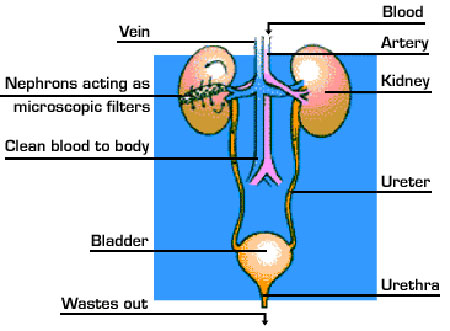The urinary bladder serves as a sack to store urine, and expel it when a certain quantity fills in or a person finds a convenient time and place to void.


The urinary bladder serves as a sack to store urine, and expel it when a certain quantity fills in or a person finds a convenient time and place to void.
Usually the number of times a person passes urine depends on many factors like quantity of fluids taken, climate, his training of the bladder, e.t.c. But once somebody has cystitis, i.e. inflammation of the urinary bladder, there is much frequency of urination.
An individual may pass urine almost 20 to 30 times in the day. Every time he or she passes urine it is urgent, i.e. there is an urge to void immediately. It is also painful. There may be associated fever, pain in the lower abdomen or back.
Cystitis can occur at any age, though the causes may be different. In young boys it could be due to congenital abnormality of the urethra (tube that serves as passage for urine to go out from the bladder).
Adult men usually suffer from cystitis due to S.T.D’s (Sexually Transmitted Diseases), where the germs enter the bladder through the urethra.
In advanced age, men suffering from enlargement of prostate or malignancy of prostate, commonly develop cystitis. This occurs because a person is unable to evacuate the bladder completely, due to the enlarged prostate and residual urine tends to get infected.
Women are more prone to cystitis as they have a shorter urethra facilitating bacteria to ascend easily in the urinary bladder. They can acquire cystitis while using common public toilettes.
Menstrual bleeding, poor personal hygiene, infection during sexual intercourse or child birth are other causes for cystitis in women. Women who develop prolapsed uterus due to multiple child births also suffer from chronic cystitis.
This happens because the prolapsed uterus compresses the bladder, and prevents complete evacuation. Residual urine remaining in the bladder facilitates growth of bacteria leading to cystitis.
An indwelling catheter can cause infection and inflammation of the urinary bladder in any individual. Stones in the urinary tract also lead to cystitis. Parasitic infections like schistosomiasis can affect the urinary bladder leading to its inflammation.
If untreated, cystitis can lead to infection of the kidneys which poses a grave threat to a person’s health as there is risk of kidney failure setting in. It can also cause sepsis, i.e. generalized infection in the body.
Chronic or recurrent cystitis leads to thickening of the bladder wall, thus causing chronic frequency and urgency of urination.
Cystitis can be easily prevented. When a person drinks large quantities of water, large amounts of urine are passed; this flushes the urinary system, thus preventing stasis and growth of bacteria. It is important to maintain good perineal hygiene.
This is more important for women, particularly during menses. They should keep themselves clean and dry. Because blood passed during menses provides a good medium for bacteria to grow.
Nylon underwear should be avoided as it tends to aggravate pelvic and hence urinary infections. One should pass urine after sexual intercourse so that any germs sticking to adjacent pelvic parts are washed away. Otherwise, these microbes can ascend through the urethra and cause cystitis.
Urinary catheters should be put in only when absolutely necessary. They should be changed every 3 to 4 days to prevent infection.
If suspected, cystitis can be diagnosed by simple microscopic examination of a urine sample. This sample should be the urine passed first thing in morning as germs tend to be concentrated in bladder, when one does not pass urine all night or maybe one or 2 times only.
The first few drops should be discarded as they could be contaminated by germs present on outer surface, thus giving false results. A culture of the sample identifies the causative microbe, and suitable antibiotic thus given can help cure the infection absolutely.
Somebody having recurrent cystitis with no apparent cause should be investigated for any congenital abnormality of the urinary system and that should be corrected surgically.
If one can prevent having cystitis, that is ideal. But even if infected once, a person should take suitable measures to see that it does not recur.


